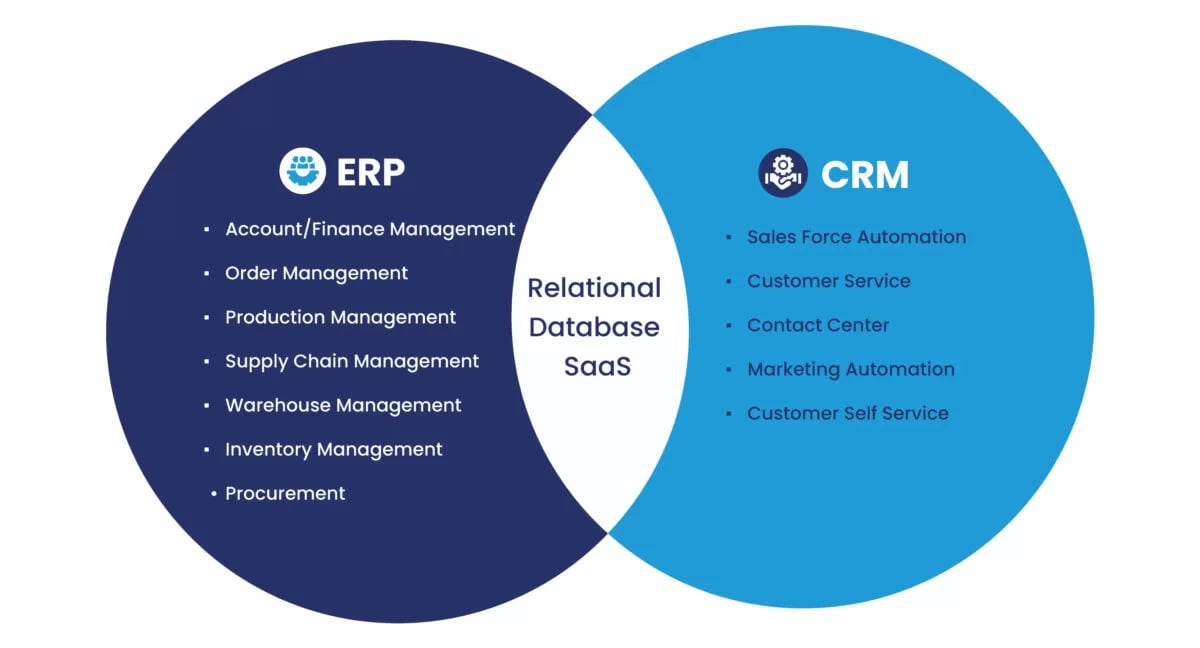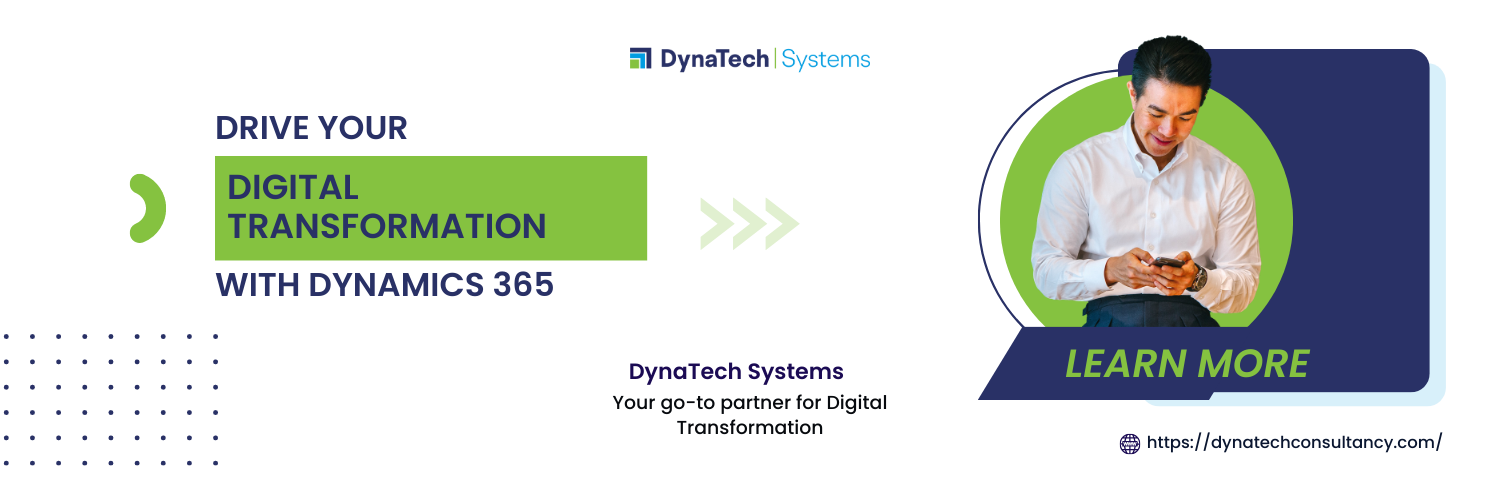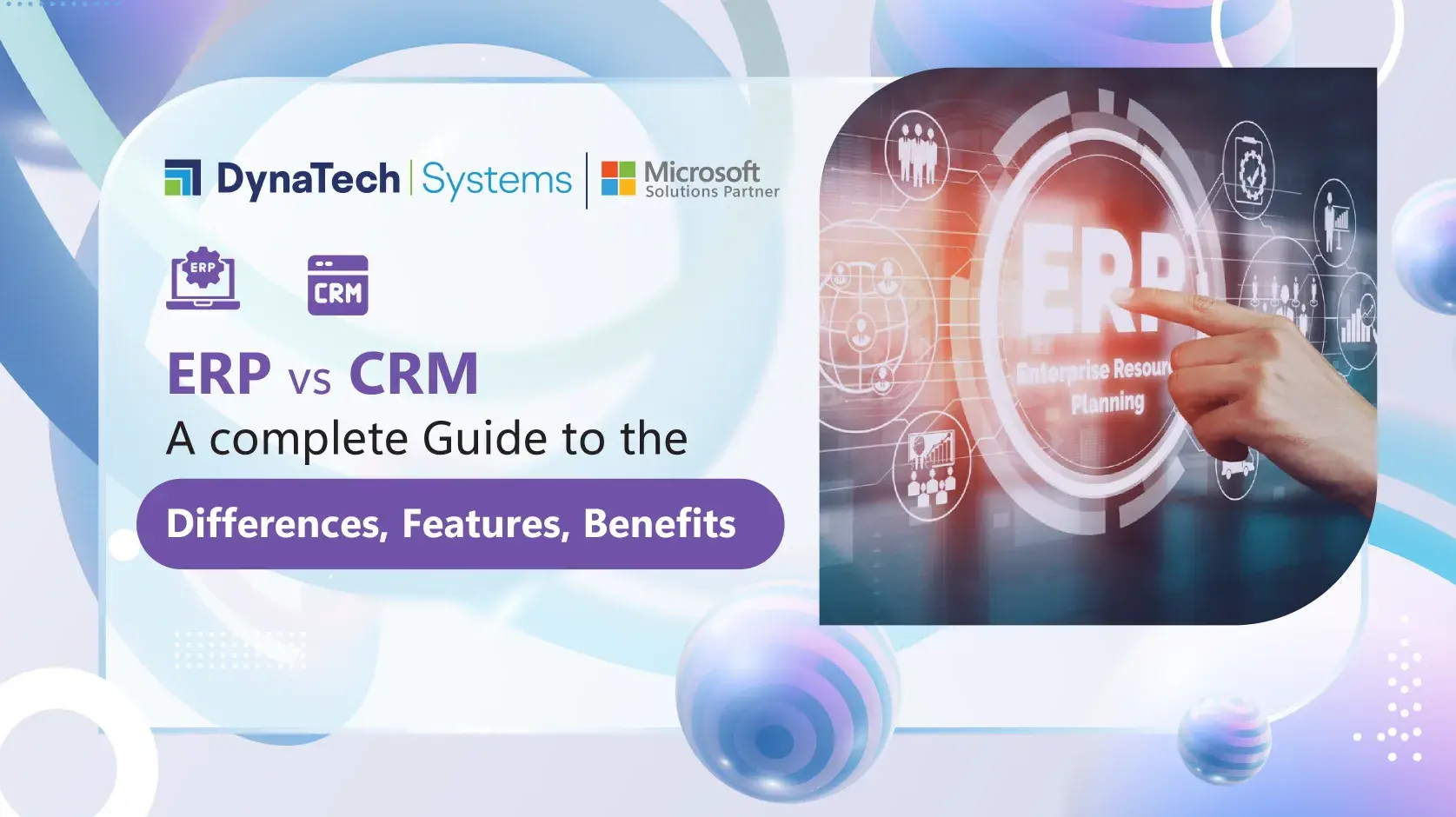ERP – Enterprise Resource Management and CRM- Customer Relationship Management are the two wheels of the same bicycle which when ridden carefully and strategically enables you to strive high in your business. But there is a fine line of difference between CRM and ERP. ERP is a general tire and can be used anywhere. On the other hand, CRM is like a snow tire which can be used for certain purposes. Overall, both ERP and CRM software have a lot in common and both aim to bring more profitability and ROI to the enterprise.
Although ERP and CRM are similar to each other, they have certain notable differences and may overlap with each other in certain areas. But the best thing is they can be fully integrated with each other ripe unmatched benefits. But as they both contain exceptional core features; you must consider them individually to easily understand how both the software works to enhance efficiency and increase sales. Let’s have a look at each of the software and understand them better:
Key Differences: ERP vs CRM
Scope of Functionality: ERP systems cover a broader range of organizational processes, while CRM systems concentrate on customer-centric activities.
Primary Focus: ERP streamlines internal operations, optimizing resources and improving overall efficiency. CRM, in contrast, centers around external relationships, aiming to enhance customer experiences and drive sales.
The Working: ERP vs CRM
ERP: Both the ERP VS CRM software allows sharing information in all the departments to enable smooth and hassle-free communication. In an ERP system, all the employees enter relevant data which is further used to create real-time insights for an at-glance overview. It renders visual data representation to help employees easily identify trends, intercept, and rectify any damage. This enables enterprises to strategically plan for issues before they turn into huge problems. Hence, ERP enables enterprises to focus on data, instead of operations. Thus, this software never disappoints in streamlining business processes without much effort.
CRM: Since several years, CRM has been continuously developed and upgraded to escalate the customer experience. The system ensures that the customer stays happy and satisfied, motivating them to stay loyal to the company and come back again and again. Hence, CRM offers features that are highly valuable to business. CRM, in essence enables you to identify potential leads and prospects, nourish them, and lead them to the sales process while ensuring closed purchase transactions. Once the prospects become customers, CRM enables you to build powerful relationships with them and motivate repeat business with either higher value or more frequent orders.
ERP VS CRM Software – How They Are Related?
ERP and CRM software can both manage contacts, quotes, companies, orders, and forecasts. Both of them can even handle line-item configuration, deliveries schedules, bundles, invoices, and much more. Though companies often get confused about both the software, they are hardly aware that they can be integrated with each other and how their features differ.
For instance, A prospect may call you and convey that they are confused which they should buy – a new CRM or ERP system. They have knowledge about the core features of the CRM system but have no idea if ERP will offer the same features.
ERP VS CRM Relation

The left side Circle indicates ERP System & the right-side Circle indicates CRM System
Here, it is important to note that most of the ERP software has certain components of a CRM system along with the ability to integrate with a 3rd party CRM system. They will work pretty well with the ERP system but may not have specialized features of a standalone CRM platform.
In short, most ERP software's have CRM components that will offer automation in marketing and sales. But such ERP systems may lack additional functionalities such as social media management, community management, and call center support. Lack of certain features may affect the overall performance of your enterprise and reduce user experience.
ERP VS CRM – The Difference
The main ERP VS CRM difference is that the software employsy different approaches to multiply profitability of the business. An ERP system primarily focuses on reducing costs and decreasing overhead expenses with automation. It helps in making business processes more effective while reducing money spent on those processes.
On the other hand, CRM works to accelerate profitability by increasing sales value. It renders a repository of customer’s data enabling stakeholders to efficiently use it to enhance customer relationship and motivate them to return, thus increasing profit.
Dynamics 365 Modules: ERP vs CRM
Dynamics 365 ERP Modules
Dynamics 365 offers a suite of ERP modules designed to address specific business needs. Let's explore some of the key Microsoft Dynamics 365 ERP modules:
- Finance
Features: Handles financial transactions, budgeting, forecasting, and reporting.
Pros: Provides real-time financial insights, improves accuracy in financial reporting, and ensures compliance.
Cons: Complexity in initial setup and potential learning curve for users. - Supply Chain Management
Features: Manages the entire supply chain, from procurement to production and distribution.
Pros: Enhances visibility and control over the supply chain, reduces lead times, and optimizes inventory.
Cons: Integration challenges with existing systems may arise. - Human Resources
Features: Covers HR functions, including payroll, employee management, and talent acquisition.
Pros: Streamlines HR processes, improves workforce management, and supports talent development.
Cons: Customization might be needed for specific HR workflows. - Commerce
Features: Facilitates e-commerce, retail, and order fulfillment processes.
Pros: Enables seamless multichannel retail, improves customer experience, and enhances sales.
Cons: Implementation costs and potential integration challenges with existing systems.
Dynamics 365 CRM Modules
Moving on to the Dynamics 365 CRM modules, let's explore the key components dedicated to customer relationship management:
- Sales
Features: Manages leads, opportunities, and sales processes.
Pros: Improves sales efficiency, enhances collaboration, and provides insights into customer behavior.
Cons: Customization may be required to align with unique sales processes. - Marketing
Features: Covers marketing automation, campaign management, and lead nurturing.
Pros: Enhances marketing ROI, automates repetitive tasks, and provides detailed analytics.
Cons: Initial setup complexity and a learning curve for users unfamiliar with marketing automation. - Customer Service
Features: Handles customer support, case management, and service request processes.
Pros: Improves customer satisfaction, streamlines service operations, and provides real-time insights.
Cons: Customization might be needed for specific service workflows. - Field Service
Features: Optimizes field service operations, including scheduling, resource management, and work order management.
Pros: Improves field service efficiency, reduces response times, and enhances customer satisfaction.
Cons: Integration challenges with existing systems may arise.
ERP VS CRM Difference – The Features
| ERP Features | CRM Features |
|---|---|
| Distribution Process Management | Seamless Marketing & Sales Management |
| Supply Chain Management | Calculate Time Spent On Converting Leads To Closing Deals |
| Services knowledge base | Automates Customer Service |
| Accurate Financial Data | Track Customer Interactions |
| Better Project Planning | Share Marketing & Sales Collateral |
| Automate Employee Life | Create Data Reports |
| Eradicate Redundant Tasks | Prioritize Leads |
| Accounting & Financial Apps | Historical Sales Data Based Inventory Management |
| Low Purchase Costs | Effective Business Leads & Contacts Management |
| HR Management | Share Customer Profiles With Team |
| Payroll | Monitor Lead Source |
ERP VS CRM – Common Features
- Integration: Dynamics 365 seamlessly integrates with other Microsoft applications, fostering collaboration and data consistency.
- Scalability: The modular structure allows organizations to scale their Dynamics 365 implementation based on evolving needs.
- Cloud-Based: Both ERP and CRM modules are available as cloud-based solutions, offering flexibility and accessibility.
ERP VS CRM – Price & Licensing Cost
Mostly the expense of ERP is more as compared to the CRM system due to the range of features and services it offers. The ERP system can be highly customized as per the preferences and needs of the company. Hence, it requires great technical skills to plan, design, integrate, and implement this system in your enterprise. Also, the infrastructure you require to host all these services on cloud can be quite heavy on the pockets. But Microsoft Dynamics 365 is a cloud based small to mid-scale business focused ERP software whose cost ranges around $79 to $799 per month which is considerably less.
A CRM system’s costs can range from being FREE to a lot of thousands of dollars. It depends on various features like the number of users, features, customization flexibility, CRM costs, ERP costs, etc. Non-enterprise level CRM system may range between $20 to $80/month/user.
ERP VS CRM – Pros & Cons
Benefits:
- Increased Efficiency: ERP modules streamline internal processes, reducing manual effort and improving overall efficiency.
- Enhanced Customer Relationships: CRM modules provide tools to understand customer behavior, personalize interactions, and drive customer loyalty.
- Data-Driven Insights: Dynamics 365 leverages advanced analytics to provide organizations with actionable insights for better decision-making.
- Drawbacks:
- Complex Implementation: The initial implementation of Dynamics 365, particularly ERP modules, can be complex and may require expert assistance.
- Costs: While the modular approach allows for cost-effective adoption, organizations must carefully plan and budget for customization, training, and ongoing support.
- User Adoption: The extensive functionality of Dynamics 365 may result in a learning curve for users, impacting initial productivity.

ERP VS CRM – Which Is The Best For Your Business?
If you have just initiated a new best, definitely go for CRM. But if your company is already using CRM software and is expanding continuously, then you need powerful software that can manage your resources and accounting transactions. Say goodbye to manual entries and cumbersome tasks, as this is the era of cloud-computing on demand data and automation. But if your enterprise is even larger you can integrate both ERP & CRM to get the best of both the worlds.
Wrapping Up
Mostly, CRM is a part of the ERP system. But this is possible only if you want. In short, you can either buy the complete package or buy ERP and CRM independently depending on the needs of your organization. You can even choose to integrate both the systems. Dynamics 365 suite offers a range of other features and applications that can be helpful to magnify productivity and accelerate sales. Which system works best for your company totally depends upon the size of your enterprise, the preferences and exact requirements of your business.
Still confused about ERP vs CRM implementation? The skilled and experienced professionals of Dynatech Systems have got you covered. Connect to discuss more at sales@dynatechconsultancy.com. and begin your journey today!




























